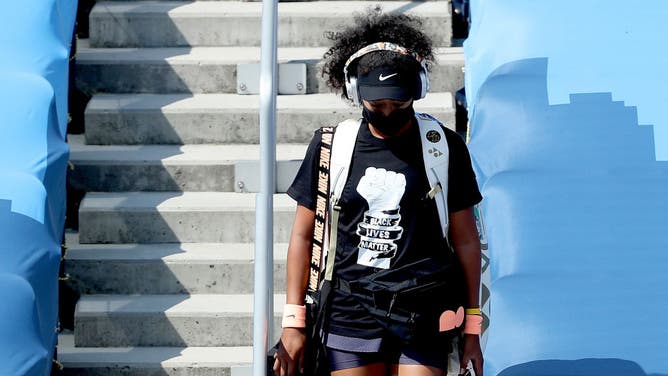You Can't Be The GOAT If You Don't Play: Osaka Withdraws From Wimbledon
Four-time Grand Slam champion Naomi Osaka will sit out this summer’s Wimbeldon, extending her mental health break after also withdrawing from the French Open earlier this month. Osaka, a 23-year-old hailing from Japan, does plan to compete at this year’s Tokyo Olympics, her agent told the Associated Press.
The No. 2 ranked female player in the world, Osaka has enjoyed tremendous success at a relatively young age, and the pressure seems to be taking a toll. What started as a media blackout in France has quickly spiraled into an unprecedented departure from competition altogether for a generational talent seemingly just coming into her prime.
Many elite athletes, especially those in singular sports like tennis and golf, have certainly felt the intensity of pressure that accompanies early success. Bobby Jones famously walked away from golf at only 28 on the heels of the winning the sport’s pre-Masters Grand Slam (the term was actually coined by Jones’ friend and journalist Pop Keeler in honor of Bobby’s achievement). The 2017 film Borg vs McEnroe depicted the heavy toll that Bjorn Borg experienced as a champion, local hero, and international sex symbol. At just 26, Borg also walked away from his sport early, albeit with a then-record 11 major championships to his name.
Part of the unspoken agreement between professional athletes and the fans who are stuck in more menial careers has always been a pact of mutual appreciation. Athletes get to live blessed lives, working a dream job and enjoying unprecedented financial freedom. The assumption is that, even on their worst day, their lives are still remarkably more exciting and fulfilling than regular people; and for this, they are expected to feel extreme appreciation for their good fortune.

MELBOURNE, AUSTRALIA - JANUARY 26: Naomi Osaka of Japan with the Daphne Akhurst Memorial Cup following victory in her Women's Singles Final match against Petra Kvitova of the Czech Republic during day 13 of the 2019 Australian Open at Melbourne Park on January 26, 2019 in Melbourne, Australia. (Photo by Julian Finney/Getty Images)
Conversely, thanks to the athlete performing, the fan gets to feel appreciation as well: for his loyalty to the team, for the experience of falling in love with sport, and on a certain level, for life itself, which can always surprise him despite its propensity for pain.
This balance of pain and pleasure is what the liberal media, obsessed with victimization and identity politics, seemingly cannot understand or appreciate. The human experience, at its most rudimentary, is a quest to find pleasure despite the pain that we self-inflict. To rob the individual of the most satisfying journey he can take—that is, the journey of overcoming his own mind-made limitations—is to completely neuter the human experience. Such thievery lies at the very core of forced equality, which is simply mental bondage disguised as progress, and is why sports serve as our most important outlet for displaying the unstoppable beauty of human evolution. The competitiveness brings out the best in us because, ultimately, it fosters an intense appreciation for the work of discovering ourselves.
The media will try to twist Osaka’s pause into propaganda in favor of a life of resentment, rather than appreciation: a young, female minority is being bullied by a disgraceful world. According to them, her depression is understandable and even peculiarly lauded. Of course, racist ugliness sometimes exists in the form of unhappy people searching for their own appreciation for life, but the visceral public reaction to her decision is really based in the breaking of the pact. Racism and sexism have nothing to do with it. Osaka is living in the rarified air of superstardom that so many regular fans would love to experience, and her apparent rejection of it feels like a rejection of the entire journey of appreciation that humans love so much.

NEW YORK, NEW YORK - AUGUST 28: Naomi Osaka of Japan makes her way to the court for her semifinal match against Elise Mertens of Belgium during the Western & Southern Open at the USTA Billie Jean King National Tennis Center on August 28, 2020 in the Queens borough of New York City. (Photo by Matthew Stockman/Getty Images)
We can accept when an athlete walks away, bruised and beaten, dripping with intensity and ready for the next challenge in life. It feels like a logical conclusion to an epic journey—both sides thankful for what the sport was able to give to them. We have less experience witnessing an athlete seemingly rejecting their own gifts and bucking the pact of mutual appreciation. Therefore, my advice to Osaka would be to absolutely tend to your mental health, but always remember the pact, as well. Leaning into the competitive expansion of life with an attitude of appreciation is the only way to ever feel true satisfaction.
The fans want to cheer for you Naomi, they want to love you and thereby love themselves a tiny bit more. Accept your gifts by adopting an unwavering appreciation for competition. Be the best, and appreciate all that tennis gives you, both positive and seemingly negative. Only then will you ever transcend the trappings of self-inflicted doubt and depression in which you currently find yourself.